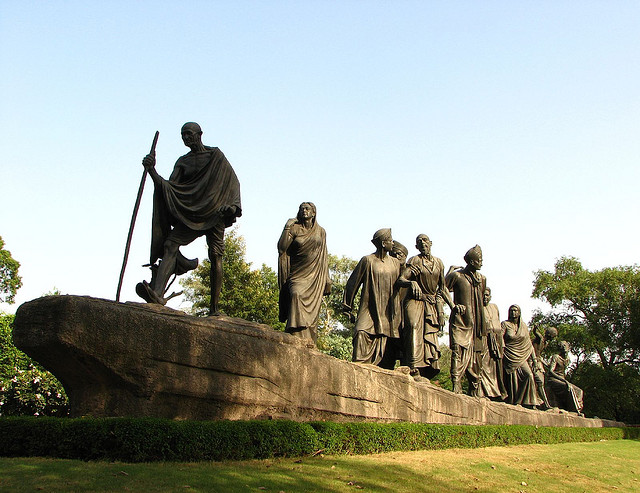
In Squaring Off, Zócalo invites authors into the public square to answer five questions about the essence of their books. For this round, we talk to Harvard University public leadership scholar Barbara Kellerman, author of The End of Leadership (HarperCollins).
Kellerman argues that our 21st century leaders are failing the public-and, in the wake of this vacuum, their followers have gained more influence than ever before. Meanwhile, the contemporary “leadership” industry is only compounding the problem.
1) What can officially appointed leaders learn from leaders like reality TV stars, who draw their power from their followers? approval rather than any formal authority?

Nothing.
There is a distinction between being famous for being famous (as Mel Brooks once put it) and being famous for being a leader. Elected and officially appointed leaders, political leaders in particular, are required, or at least expected, to do certain things that will displease at least some of the people some of the time. Celebrities, in contrast, properly set out to please all of the people all of the time.
Leaders ought to be prepared to do what they should-even if it means losing an election. The fact that so many public officials now seem more set on winning re-election than on doing the right thing might, indeed, explain why leaders and celebrities tend to be conflated.
2) You believe that we should judge our leaders in part on whether they act ethically. So what does it mean that we turn to celebrities, who so often act unethically?
A good leader is both ethical and effective, and a bad leader is one who is either unethical or ineffective, or both.
So, yes, I believe ethics matter. But celebrities are, as I’ve noted before, animals of a different stripe. Their responsibility to their public is to entertain; by and large, ethics are beside the point. Most don’t even pretend to be models of good behavior.
One more point deserves to be made: Americans are generally quite forgiving, particularly when an apology is tendered, but this does not mean that Americans no longer value strong ethics. Rather it’s that we’re more jaded, less surprised by bad behavior.
3) You argue that the leadership industry is failing. What do you think should be arising in its place?

The leadership industry-my catchall term for leadership seminars, books, coaches, etc. that claim to teach people how to lead-is a business that assumes, often with no evidence, that we can teach people how to lead both wisely and well. Furthermore it’s a business that is self-satisfied and uncritical, and in no way regulated or evaluated.
Were I the queen of the leadership industry, I would teach leadership and change (how patterns of dominance and deference have changed over time). I would instruct on followership right alongside leadership. I would emphasize contextual intelligence over nearly all the other intelligences. I would develop a core curriculum. I would sequence leadership learning so it has some sort of internal logic. I would not assume one size-that is, one pedagogy-fits all. I would teach leadership over a lifetime-or, at least, over a period of years. I would include instruction on the dark side-that is, not only how to grow good leaders but how to stop bad ones. I would develop clear metrics of success. I would integrate the liberal arts-and the fine arts-into leadership learning. I would develop generalists, not specialists.
4) You say leaders should be prepared to displease their followers but your book stresses the growing strength of followers. Is there a contradiction here?
Quite the contrary. One of the reasons followers are growing stronger and leaders weaker is precisely that elected leaders are so fearful of not being reelected. Put differently, only by being willing to displease followers, to do what they think they should do rather than what others think they should do, can leaders regain their independence.
I’m well aware of course that this is difficult in a day and age when leaders are being bombarded 24/7 not only by rantings on old and new media but also by ordinary people who post or tweet or chat or blog, often in a voice best described as vulgar. As Clay Shirky observed, we live in a time when “every member of the public is a media outlet.”
The balance of power between leaders and followers has shifted, with leaders getting weaker and followers stronger. Both sides are complicit in this. Multiple problems now beset American politics-one of which is our refusal to recognize that, whatever the inadequacies of our leaders, their followers are similarly flawed.
5) What has changed the balance of power between leaders and followers?
The balance of power between leaders and followers has been shifting for centuries. In times long past it was all about the hero-leader-think, for example, of Plato’s ideal, the philosopher-king, or of Machiavelli’s all-powerful prince.
Since then, the most striking example of leaders getting weaker and followers stronger was during the Enlightenment, when the great western philosophers argued that power must be shared, leaders must be constrained, and followers (ordinary people) must be allowed to participate in civic life. The American and French revolutions then threw out the idea that kings could claim a divine right, which overturned the old order in favor of the new.
The playing field has been leveled still further-in part by liberator-leaders such as Lincoln, Gandhi, Mandela, and King, and in part by the various rights revolutions, especially in the U.S. during the late 1960s and early 1970s.
Even in the last 10 years followers have gained power at the expense of leaders. Technology-social media especially-has enabled followers to connect and communicate in ways they never have before. Moreover their access to that most precious of resources-information-is unprecedented.
Buy the book: Skylight, Powell’s, Amazon.
*Photo courtesy of Aditi Pany.



